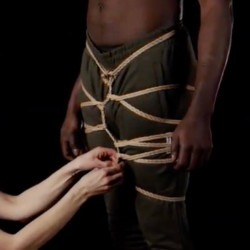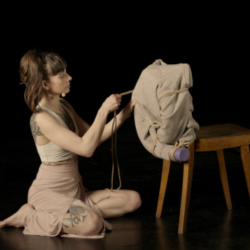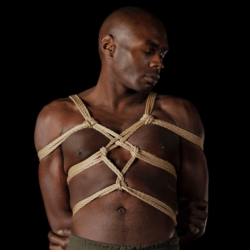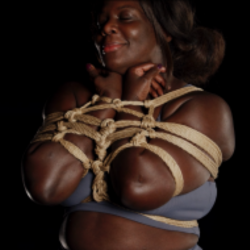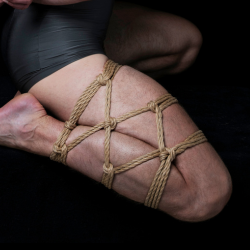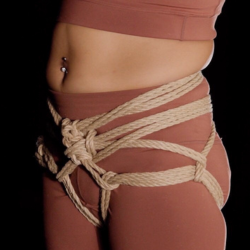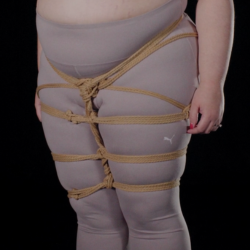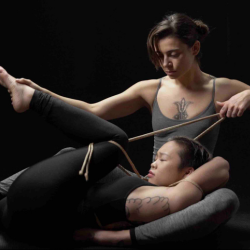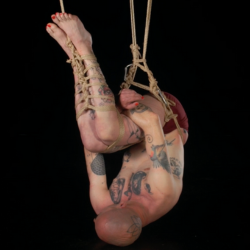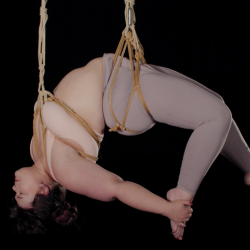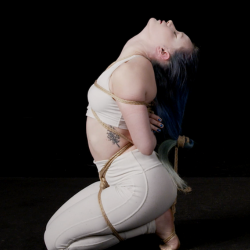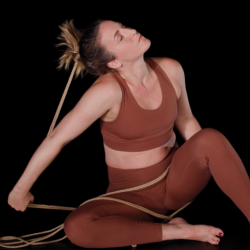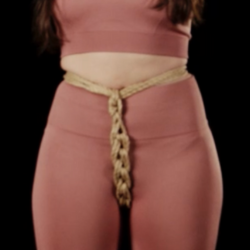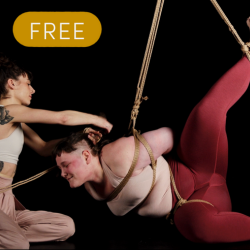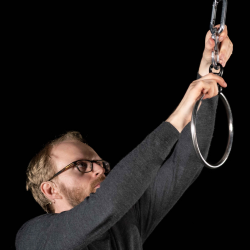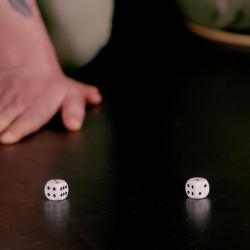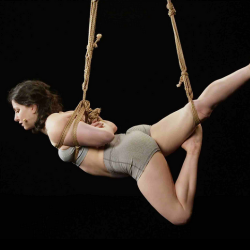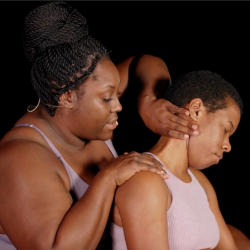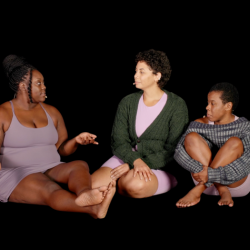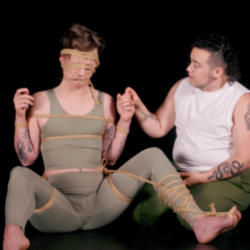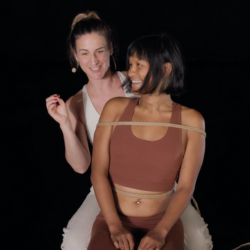EP 12
TWISTED LILY
With emphasis on ethical negotiation, Twisted Lily focuses on the importance of exploring different rope techniques and style, while also discussing the possible limitations there are to categorizing rope styles.

Twisted Lily is an Atlanta-based rope enthusiast and has been involved in rope for over a decade. She teaches sometimes and also hosts local events.
Wicked Wren [00:00:23] Hello and welcome to the Shibari Study podcast. I'm your host Wicked Wren and today I'm speaking with my friend Lily. You'll know Lily as Twisted Lily on the internets. She is from Atlanta and she's been involved in rope for about a decade. Hello, Lily.
Twisted Lily [00:00:41] Hi. Excited to be here.
Wicked Wren [00:00:43] How'd you get into rope? Like, how did you find it? What appealed to you?
Twisted Lily [00:00:47] I think for me, rope was really twofold. So there is a very straightforward (…) aspect to rope for me. My primary interest in (…) is around power exchange, and I think there's some inherent power exchange that comes along with doing bondage. And for me, the most versatile and fun and really useful type of bondage happens with rope so that's really one side of it. And then on the other side, I would say there's kind of a social and also more stress relieving aspect as well. Making things with my hands is really different than how most of my life goes. And creating stuff that's very tangible and physical can be a certain kind of stress release for me. And also there's the aspect of problem-solving. I like communicating through touch, but I'm not a cuddly type of person really. So I think it meets a lot of needs a lot of the time. And I spend most of my social life centered around rope, honestly. So.
Wicked Wren [00:01:52] Yeah. And are you mainly a rope top?
Twisted Lily [00:01:55] Yes, I do mostly tie. I employ bedroom bondage as a bottom and I have one partner who I'm kind of up for most types of bondage with as a bottom. But I would say 98% of my rope and bondage life is around tying and being the person tying for sure.
Wicked Wren [00:02:12] That's awesome. And it sounds like rope isn't a super (…) thing for you. It's more about power dynamics and that sort of thing.
Twisted Lily [00:02:22] I don't know. I mean, I think it's the big question, like, what is next? Right? And I don't know if we have time if we had five years to answer that question, maybe. But for me, power exchange and what is (…) are very interrelated. So rope can be a lot of different degrees of (…). Sometimes it is 100% and sometimes it's 0%. And everywhere in between, mostly depending on what the relationship is with the person who I'm tying with or what we've negotiated for that moment. Though, I wouldn't say it's non-(…) or purely (…). And I think that might be a little unique in that I like to enjoy it in both ways.
Wicked Wren [00:02:59] Can you talk to us a little bit about when you're in a rope scene and there is this power dynamic? How are you doing that ethically? What are some things that you have in mind there?
Twisted Lily [00:03:11] I think thinking about power dynamics and growth, there are two ways to approach it. So we could talk about how to use rope as a way to enhance power dynamics. And I also think there's a consideration around how you consider navigating the effects of the inherent power dynamics that exist between people. So like I said, I think that rope inherently has an element of power exchange on it, right? Like when a person allows you to manipulate their body, restrict their movement, and kind of take that freedom and autonomy away from them. I think there's a bit of a natural one person having more control or power or impact over the other, right. When you're talking about partner and rope scenes. And so how far you go into that negotiation, I think the way I'd generally term it is, how collaborative do we want to be here? You know, so when I'm negotiating around rope and power exchange, I usually start from we're both going to have influence over what happens and how much influence are you seeking or how much influence are you seeking to give up? What level of comfort does a person have around not having a lot of control over what happens. I think that's just over... over time, it's really been a more central part of my negotiation than it was early on when it was just like, I will do things to you, you know?
Wicked Wren [00:04:39] So what does your negotiation process look like? How has it changed over the years?
Twisted Lily [00:04:46] I think negotiation is so unique to whatever relationship exists between the two people negotiating outside of that conversation. So if someone is, you know, someone I've been tying for five years and or a close friend and there hasn't really been a lot of change in their life or my life or the relationship, it could be very easy to negotiate and just a few minutes around like, do we want to stay in the realms we've explored before or do we want to try anything new? Is there anything that you would rather not do that we've done in the past? And that can be very simple. But if it's a person who's more new to me or someone with a big experience gap, I can take a pretty long time just talking about what draws someone to want to be tied? What draws someone to want to be tied by me specifically and then where they really are as far as the amount of context they have around their own risk and their own, you know, interests and how much they may know about their body, how their body feels and behaves in rope, and also their mental-emotional side as well. You know, a lot of times people can have very surprising experiences in rope, and that can happen certainly with a lot of experience, but it's a little less likely. So I think the care I take in that has a lot to do with those experience gaps and also the individual relationship.
Wicked Wren [00:06:11] That makes total sense. If there was one question you could ask in the context of a new rope relationship, what would that question be? You could only ask one in some crazy world.
Twisted Lily [00:06:25] I think it would be about feeling. That sounds very deep, though, but I think like what feelings are you looking to experience in, you know, the next hour with me or kind of probably, you know, that's just the beginning of a conversation because there are plenty of feelings that I would not – like we wouldn't have overlap necessarily around the feelings that people might express then, but I think that would probably be the starting point. I can't imagine only having one question to ask. That's really hard. Yeah.
Wicked Wren [00:06:59] But that does make sense because it's like getting both parties on the same page on what the outcome is going to be. And if you don't know the outcome that both parties want, then how is it going to be successful?
Twisted Lily [00:07:11] For sure. For sure. And where those overlap, right? I think some people maybe have lots of directions they're interested or willing to go in and figuring out the ones that overlap with both parties I think is super important and obviously acknowledging that there's an element of unpredictability that's always at play as well.
Wicked Wren [00:07:28] Definitely. Well, the unpredictability is one of the most fun parts.
Twisted Lily [00:07:33] Yeah, absolutely.
Wicked Wren [00:07:34] Over the last decade that you've been doing rope, what are some of the trends that you've seen come out?
Twisted Lily [00:07:40] Sure. That's a great question. I think one of the things that I've been thinking about a lot lately is something that's maybe emerged in the last five years. I'm sure it's on a cycle. I'm sure it's emerged many times in the past before I was aware of it. Because everything – there's nothing new, right? But one of the things that I think can be a little bit harmful and hard, especially like having my own, the way I view rope education and the way I approach it, one thing that can be challenging for me is the sort of false binary that I think gets set up between styles of rope, right? So many people approach rope from a perspective of learning from one specific teacher who teaches in a specific style that might be part of a lineage that has a lot of historical impact. And I have a ton of respect for that. I think it's an amazing way to go deep and to like a certain type of art or practice. And I know that there's a ton of history and tradition around it. It has not been my approach, generally. I have had the opportunity to learn from a lot of different rope instructors from different places in the world, and I don't have a specific style or teacher or instructor that I think is the beginning and end of how I tie in and how I want to tie. And so one sort of binary that I've seen that has emerged out of people sort of associating their style with very specific other people's styles is that we create boxes and labels to put around our rope that I personally find a little limiting. You know, I remember the first time, I think it was in 2019 when I heard someone from another part of the country say that, Well, if you're into SM, you can't do a lot of transitions. If you're doing – if you're staying in the air for a long time and doing a lot of transitions, that is mostly for performance. That's about circus stuff. That's not (…). That's, you know, that's a very specific thing. And then there's like SM and suffering and that's the opposite, right? So there's like this weird line between those two things. And on one side of the line is technically challenging, physically challenging, but performance and the other side is like maybe also a little more straightforward or simple, but that's what emotion is about and that's about the interaction. And I think for me, the technical way that I tie can often look a lot more like us spending a long time in the air and doing a lot of transitions or whatnot. But the reason for that is more on the other side of that kind of false binary. Like I am doing that to create a journey of suffering. And so. I just have had a difficult time with a lot of people categorizing those two types of rope as like either or. And I think you can have different goals. And the goals don't necessarily always define technique, but one of the outcomes of sort of tying ourselves to specific styles and teaching can be that you think that you know a lot more about what the other style is than maybe what if you had experienced multiple types of rope and styles of teaching and different lineages. So while I have a lot of respect for people who are very rigid in their tying style, it's just – it hasn't been the right route for me. Like I'm not a professional, I don't need anyone else's instructor name like associated with my name in order to get to do the amount of rope I want to do. And so I just would encourage people to be a little more open about the boxes that they put their tying and bottoming style into, because I think it's very possible to have a mixture of objectives and a mixture of audiences and a mixture of techniques.
Wicked Wren [00:11:43] Yeah, there's a lot more nuance to it than what we like to, you know, prescribe.
Twisted Lily [00:11:49] Sure. And it's human nature, right? You see something you like and you want to do it. And so you think that's the way I will tie. I think in doing that you are saying no to a lot of other things. And for me, being able to study with people from very different backgrounds and different lineages of technique has allowed me to kind of create some hybrid versions of those things that I feel sometimes feel more like my own. And that might not be everyone's objective, but for me, I really like having things that feel like a combination of things that I've learned that feel like mine and the person I'm doing them with.
Wicked Wren [00:12:27] Totally. Yeah. It's really safe to put yourself into a box because it essentially says, I can grow, but I can only grow within this box of this style and everything outside of that I don't have to worry about. But it's also very limiting, like you said.
Twisted Lily [00:12:43] Yeah. Yeah. And they can even come across us, like, presuming a lot about what's going on between two people. I think that there are scenes that I have had that people might see as more performances where I had no idea whether anyone else was in the room or not. You know, so it's really not... It's not always possible to know what goes on between two people and assuming based on technique or style of rope seems just limiting and not very open-minded.
Wicked Wren [00:13:11] When you started tying, did you put yourself into a box?
Twisted Lily [00:13:15] Oh, my goodness. I've been in so many boxes. Yeah. Again, I think labeling things and limiting them is so natural for humans to do. But I definitely have been through lots of iterations of putting myself in a box, then breaking out of it, and then just finding I was in another slightly larger box.
Wicked Wren [00:13:35] Yeah. Do you think that you are currently in a box and you're going to find out you're in a box?
Twisted Lily [00:13:42] Oh, my gosh. I'm sure. Isn't that just like the human experience? I don't know. I hope not. Yeah, but I'm sure.
Wicked Wren [00:13:50] But it's amazing that you're, you know, constantly getting into new things. Sounds like you have very, very little ego about things, and that allows you to grow and experience and explore.
Twisted Lily [00:14:02] Oh, gosh. I don't know if I can claim to have a little, little ego. I am a rope top after all. But yeah, I will take it as a huge compliment and I will take it to the bank.
Wicked Wren [00:14:10] You know, I take it back, actually. I realize what I said. Really flirting with disaster here. So I take it back.
Twisted Lily [00:14:20] Yeah, I understand. It's fine, but I think it could be a dangerous assumption. So it's hard to maintain any sense of... Any sense of low ego, I think.
Wicked Wren [00:14:34] Absolutely.
Twisted Lily [00:14:35] A worthy cause.
Wicked Wren [00:14:36] So what are you excited about right now? Like, what's keeping you going?
Twisted Lily [00:14:42] I think really frequently about a beginner's mind and about going back to basics with new understanding of complexity, right. So every time I have changed the way I lock off my up-lines or something. Or every time I have learned a pattern that I like better than my default pattern for that thing, right? It forces you into this kind of awkward period where you have to approach things with a beginner's mind again. And I think I've probably been through like five or six really significant versions of that. So when you're learning something new and complicated, there's always an inflection point in the beginning where you think, I know, I know enough about this, and it's usually just enough to be dangerous, right? And so exploring the plateaus after that I think can be so fascinating. And that's where I've really had a strong depth of learning, I think. It was five or six years in where I started thinking to myself, How does my body negotiate in this space and movement? And how am I both protecting and thinking about grace in my own movement, right? I'm not sure if you've seen videos of yourself tying. It's usually really challenging to see yourself doing something that when you're doing it, you feel confident and encouraged, and then you watch a video, you're like, Wow, I've never seen anything so dorky in my life. Who is that person? What faces are they making? That's insane. And I had that experience so many times that I started consciously thinking about how do my movements impact this... The feel that the person I'm tying has around this experience. I've been trying to focus on, how can I kind of be, you know, especially suspension. The greatest tool and the greatest enemy is always gravity, right? So how can I make a gravitational pull not just up and down? How can I feel like the thing that it's gravity that is pulling a person into certain shapes or movements? How can that be me and not just the ground? And I think that is super weird and conceptual and nerdy, but that's probably where my experimentation is right now in a lot of ways. And that is definitely a result of just hearing other instructors talk about that and having them be open to discussing it, you know?
Wicked Wren [00:17:19] Amazing. Well, next episode, we're going to talk about that. But let's turn to Gravity.
Twisted Lily [00:17:27] Gravity.
Wicked Wren [00:17:29] Yeah, that's amazing. Well, I want to thank you so much for being on. Thank you. I've learned so much talking to you.
Twisted Lily [00:17:34] Yeah. Thank you. I learned so much talking to you as well. And I'm always up for lots of nerdy iterating about rope if I could spend my whole life doing nothing.
Wicked Wren [00:17:45] Well, great. Part two going to be about being in rope.
Twisted Lily [00:17:48] Perfect. Perfect.
Start your free 7-day trial
Get one free week of unlimited access at Shibari Study,
then pay from $17.90/month. Cancel anytime.


